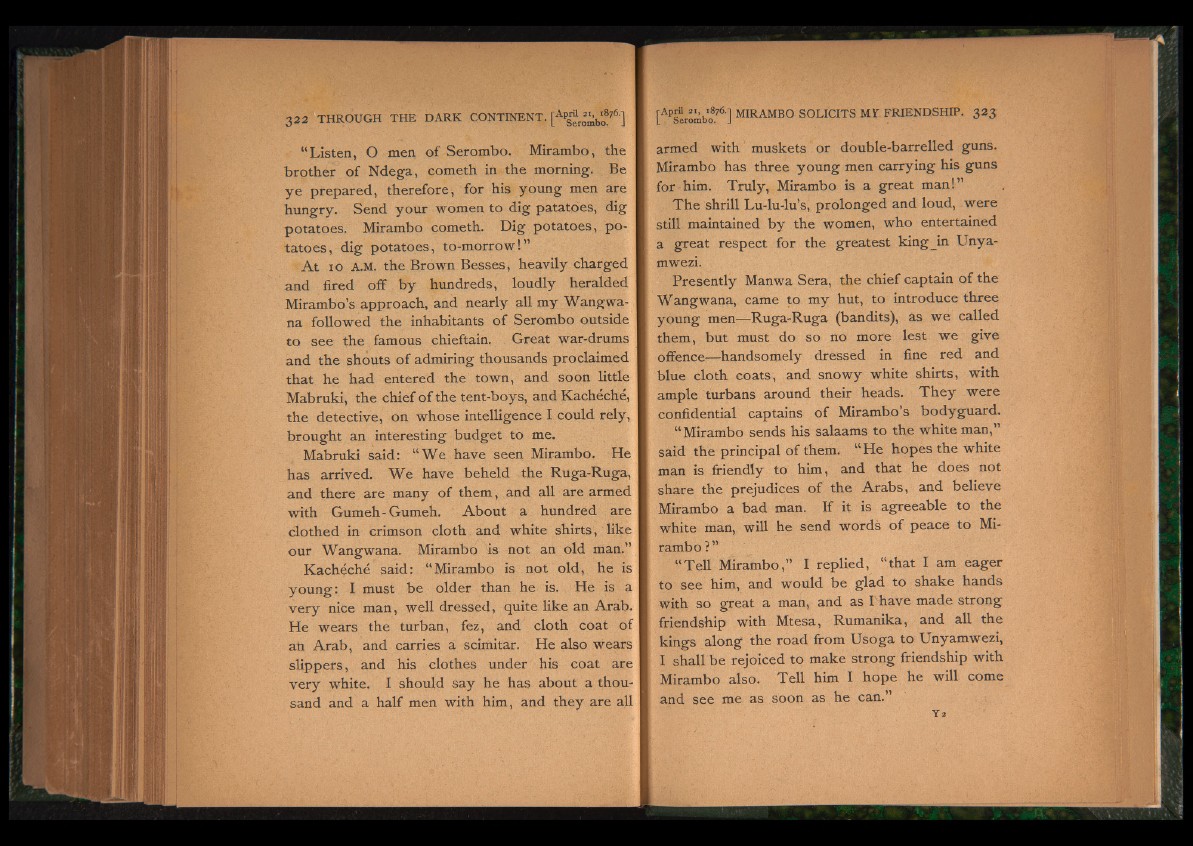
“ Listen, O men o f Serombo. Mirambo, the
brother o f Ndega, cometh in the morning. Be
y e prepared, therefore, for his young men are
hungry. Send your women to dig patatdes, dig
potatoes. Mirambo cometh. D ig potatoes, p o tatoes
, dig potatoe s, to-morrow! ”
A t 10 A.M. the Brown Besses, heavily charged
and fired o ff b y hundreds, loudly heralded
Mirambo’s approach, and nearly all my Wangwa-
na followed the inhabitants o f Serombo outside
to see the famous chieftain. Great war-drums
and the shouts o f admiring thousands proclaimed
that he had entered the town, and soon little
Mabruki, the chief o f the tent-boys, and Kacheche,
the detective, on whose intelligence I could rely,
brought an interesting budget to me.
Mabruki said: “ W e have seen Mirambo. He
has arrived. W e have beheld the Ruga-Ruga,
and there are many o f them, and all are armed
with Gumeh-Gumeh. A b ou t a hundred are
clothed in crimson cloth and white shirts, like
our Wangwana. Mirambo is not an old man.”
Kacheche said: “ Mirambo is not old, he is
young : I must be older than he is. He is a
v e r y nice man, well dressed, quite like an Arab.
He wears the turban, fez, and cloth coat of
ati Arab, and carries a scimitar. He also wears
slippers, and his clothes under his coat are
v e ry white. I should say he has about a thousand
and a half men with him, and they are all
armed with muskets or double-barrelled guns.
Mirambo has three young men carrying his guns
for him. Truly, Mirambo is a great man!”
The shrill Lu-lu-lu’s, prolonged and loud, were
still maintained b y the women, who entertained
a great respect for the greatest king_in Unyamwezi.
Presently Manwa Sera, the chief captain o f the
Wangwana, came to my hut, to introduce three
young men— Ruga-Ruga (bandits), as we called
them, but must do so no more lest w e give
offence-— handsomely dressed in fine red and
blue cloth coats, and snowy white shirts, with
ample turbans around their heads. T h e y were
confidential captains o f Mirambo’s bodyguard.
“ Mirambo sends his salaams to the white man,”
said the principal o f them. “ He hopes the white
man is friendly to him, and that he does not
share the prejudices o f the Arabs, and believe
Mirambo a bad man. If it is agreeable to the
white man, will he send words o f peace to Mirambo?”
“ T e ll Mirambo,” I replied, “ that I am eager
to see him, and would be glad to shake hands
with so great a man, and as Phave made strong
friendship with Mtesa, Rumanika, and all the
kings along the road from Usog a to Unyamwezi,
I shall be rejoiced to make strong friendship with
Mirambo also. T e ll him I hope he will come
and see me as soon as he can.”